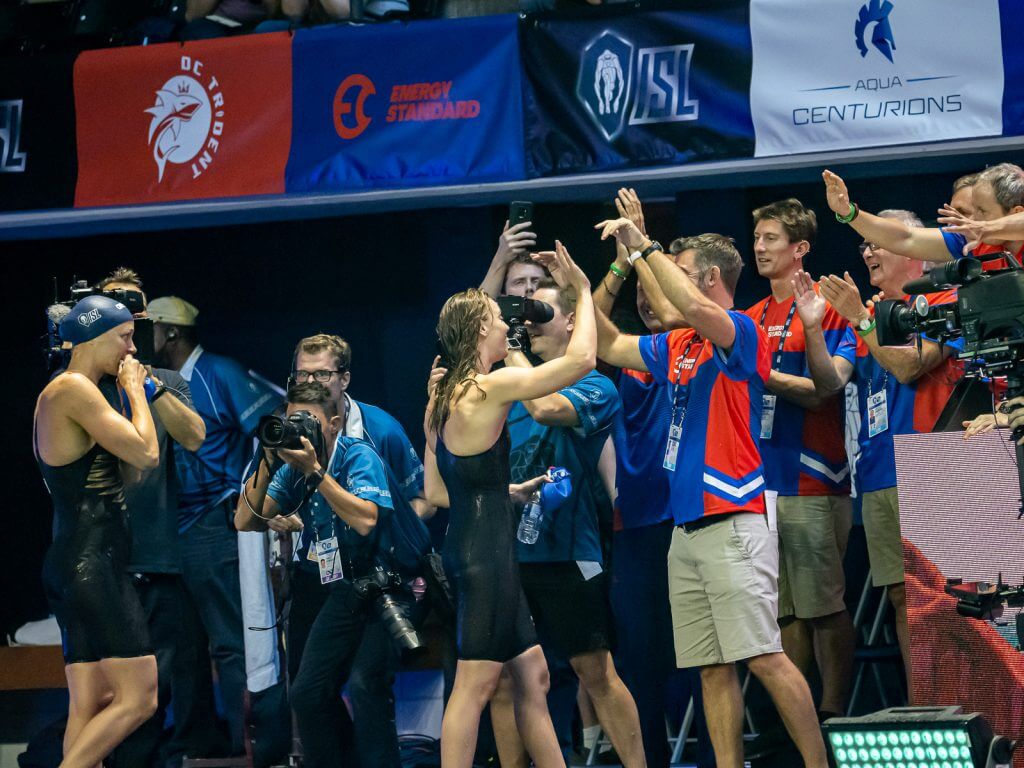The Positives of Having a Supportive Team and Fans

The Positives of Having a Supportive Team and Fans
By Riley Dunn, Swimming World Intern
Having a supportive swim team and peer group can make all the difference in an athlete’s swim career, no matter what level they might be at.
A supportive swim team is easy to spot. The swimmers compliment each other’s performances, cheer for each other, and swim as fast as they can on relays. Athletes remain motivated and excited even after a bad swim. Their fan section – often made up of team parents – help to motivate and encourage the young athletes.
However, it can also be easy to spot a team without supportive athletes. On these teams, there seems to be a lack of direction and little excitement. These swimmers don’t want to be around each other for longer than they have to. Their relays typically seem disjointed and unmotivated attempts at good swimming.
Naturally, the healthier environment for a swimmer to be a part of would be the first example – the supportive team. But why is this?
One could make the argument that swimming is purely an individual sport. Swimmers race for themselves, and their times reflect their own hard work and effort. That’s all true. But, swimmers still must participate in the various relays and cheer for their teammates. Doing this makes the swim season that much more motivating and inspiring, while also improving individual performance.
So, why wouldn’t you want to support your teammates?
Relays
Relays are important events because they teach swimmers about teamwork and about how their own performance can affect three other people. Nobody wants to let their team down with a half-hearted anchor leg. At least, nobody who enjoys their sport and all the passion and motivation that come with it.
Teamwork is an important aspect of relays as well. Each member of the relay has his/her own specific strengths and weaknesses. For example, on the medley relay, each swimmer must swim a different stroke – most likely the stroke that they are the most comfortable and confident in. A butterflier wouldn’t have the same skill set as a backstroker and a freestyler would not be at ease performing breaststroke kicks. However, all of them contribute to the relay with their own strokes and abilities. They each give the opportunity to improve their own events while also helping out their teammates.
“Why is teamwork important? It doesn’t mean everybody doing the same thing or everybody being able to do each other’s jobs. It’s more a means to a synergistic way of working, where the sum is greater than the parts,” the article ‘Why Is Teamwork Important?’ explains.
Relay teams can be fun and energetic – and can also give the audience some exciting and meaningful races to cheer for.
The Cheering
During the COVID-19 era, it has become difficult for some swim fans to watch their athletes in person. Building regulations and restrictions have forced some teams to become creative. Coaches have learned how to broadcast swim events and get parents watching and involved – even if they can’t be there cheering their child on in person.
As for the team, some high school and college level meets are requiring their athletes, or at least some of their athletes, to stay off the pool deck area. This makes cheering for competing athletes difficult.
But what effect does this have on the swimmers themselves?
Hearing supportive cheering from excited fans or other swimmers can affect an athlete’s mindset. It is commonly accepted that cheering positively enhances an athlete’s performance. They hear the encouragement, internalize it, and try to swim their best possible race.
“While sports fans typically don’t have any effect on influence on an athlete’s physical ability, fans have the power to make or break some professionals’ psyche and can enhance or undermine concentration,” the article The Psychology of Sports Fans: How Fans Affect Players explains, going on to emphasize the variety and intensity of different fans.
Hearing someone say, “You can do this,” helps certain swimmers to overcome doubt, power through their race, and swim a good time. Athletes don’t just physically perform, they have to mentally perform as well. And, without the cheering encouragement of the fans, mental toughness has become all the more important.
Hopefully, in the future, more safe opportunities for both fans and supportive teammates will open up in order to give some of the external energy back to swim meets.
Supporting a Teammate
There is no set way to help support a teammate since everyone is different and will have different things that motivate them. However, just saying “You’re doing great!” or giving your teammate a pat on the back can help improve their mindset.
No swimmer should have to face their challenges and alone and with a supportive team and peer group, they don’t have to.




GREAT ARTICLE on how important it is participate on a team. Thank you, Riley!!
Wonderful article!! Great job Riley ?